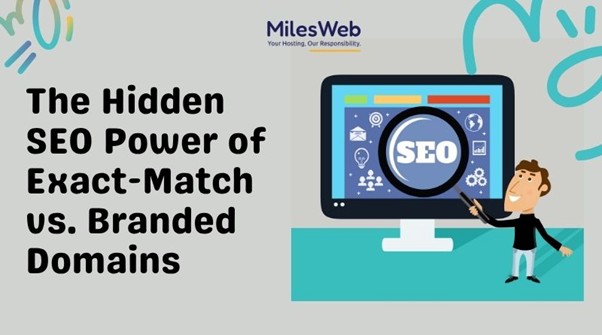The Hidden SEO Power of Exact-Match vs. Branded Domains
In the digital era, one of the first and most important milestones in developing a website is registering a cheap domain name. Though it may seem like a straightforward exercise in branding, selecting a domain name may have far-reaching tacit SEO implications, which in turn may negatively affect a business’s visibility, credibility, and growth for many years to come.
In the case of India domain registration, there are two dominant thoughts: EMDs, or Exact-Match Domains, and Branded Domains. Both have their pros and cons. Knowing the nuances of each for SEO purposes helps plan better for web presence.
What is Exact-Match?
An Exact-Match Domain (EMD) is a domain name that a user is most likely to associate with or search for. For instance, consider a business that sells shoes for running. Their EMD could be buyrunningshoes.com. EMDs are built to harvest search traffic by directly matching with the query for which the search is being done.
What are Branded Domains?
Branded domains are original, unique, and custom domain names that usually do not relate to specific sets of keywords. These include Nike.com or Zappos.com domain names. Unlike Branded Domains, Branded Domains do not prioritize a specific term but seek to attain memorability and uniqueness while gaining authority in the long run.
The SEO Power of Exact-Match Domains
If we do not focus on the practical aspect, owning an exact match domain seems like an unlocked level for SEO potential. Here’s why:
- The domain name features the keyword, which alerts these engines to a high competitive correlation. It could assist the domain to rank for queries in less time, particularly in less competitive areas.
- The willingness of a user to click an exact match domain is higher compared to a non-exact match. Take, for instance, booking a flight. Customers will have no problem trusting the domain name of cheapflights.com rather than an unclear brand name.
- The keyword is already in the domain; thus, less on-page optimization will need to be done to be considered relevant for targeted queries.
Issues around exact match domain names:
- The 2012 EMD bluntly stated that Google softens the advantages of low-quality EMDs, which do not add any value besides heavily concentrating on the keywords.
- The main problem, however, is that people do not recognize an exact match domain; hence, brand loyalty is scarce. It is much easier to associate something like Geico than bestcarinsurance.com.
- More difficult, an EMD could be more simple, but broadening your niche will become increasingly difficult. For example, if you started selling apparel and accessories, runningshoes.com may not be the best fit.
SEO Power of Branded Domains
A distant-type domain takes an opposite approach with an emphasis on focus, domain authority, and trust for the ages. Some of their undisclosed domain SEO merits are
● More Brand Equity:
Trust and authority are more respected by Google nowadays. Branded domains enable you to gain branded searches and recognition and cultivate domain authority over time.
● Link Building Opportunities:
Earning natural backlinks is much easier when the brand is memorable. For example, it is easier to link to Etsy.com than to a vague, generic, keyword-driven website.
● Enhanced Growth Opportunity:
Domain expansion is much easier when you are not constrained to a specific keyword or niche. Working with a branded domain provides more flexibility for business expansion.
● Consumer Loyalty and Trust:
Repeat and more likely visits are expected when the brand is distinctive. More generic names lead to fewer visits. Indirect traffic benefits branded names due to more loyal customers.
Challenges surrounding branded domain names:
- Branded domains are not as quick to rank as EMDs. Having keyword relevance boosts your chances of gaining traction on Branded Domains.
- Increasing Marketing Exposure: Constructing an organization will need strong marketing and content, as well as, at times, a wider budget to help create a spillover to awareness.
Exact Match vs. Branded Domains: Who Wins for SEO?
The answer revolves around the goals set for the business.
In case you are operating in an industry that is very niche, you are trying to win search rankings, and are, therefore, right in the domain, then an exact match will help you more than other options. For example, a business in Mumbai that is local and focuses on pest control will likely face more competition in this domain than others, thus dominating the market.
A business that focuses on scalable operations and plans for sustainable growth in the future will, in this case, find a branded domain more sustainable. The expansion of a business centered primarily on books, such as Amazon, to a global market will be more likely done with this than with a complete domain match of buybooks.com.
Real strength comes when both approaches are combined.
Tripadvisor.com and Booking.com are examples of brands that contain keywords. This approach provides more value because the intent behind the search is more geared toward brand building.
Conclusion
In domain selection, the most critical factor is making sure your choice aligns with your business goals five to ten years into the future. Although EMDs may provide a fleeting SEO lift for niches, there is more faith, credibility, and sustainable development potential when using branded domains.
Ultimately, your domain name lays the foundation for your online presence. Prioritize keeping customer loyalty and the trust they have in your brand as much as you do trying to obtain high-ranking placement.


Leave a Reply